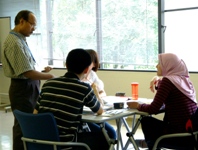IMF Regional Office for Asia and the Pacific (OAP)
Japan-IMF Scholarship Program for Asia (JISPA)
Invitation of Expression of Interest
Tender for the Orientation Program
The International Monetary Fund (IMF) is inviting graduate schools of Japanese universities to express their interest in a tender to select a university which will conduct a two and a half month Orientation Program (OP) for incoming scholars of the Japan-IMF Scholarship Program for Asia (JISPA) starting from the summer of 2018 for eight successive annual intakes1 . The OP aims to ensure that scholars entering the JISPA are well prepared to commence studies at their partnership universities and to adjust to life in Japan.
JISPA
The IMF Regional Office for Asia and the Pacific (OAP) administers JISPA, which is funded by the Government of Japan. JISPA invites junior government officials of key economic agencies, such as central banks and ministries of finance, economy, and planning in target countries.2 It aims to contribute to capacity building of their institutions in economic policymaking, and promote sustainable growth in the developing economies in the region.
Around 30-40 government officials each year are awarded scholarships to study on one-year or two-year Masters Degree programs in macroeconomics or other relevant fields at four “partnership universities”: (1) National Graduate Institute for Policy Studies; (2) Hitotsubashi University; (3) International University of Japan; and (4) the University of Tokyo. All courses are taught in English.
Minimum Requirements
The OP will offer intensive courses in academic English; mathematics for economics/introductory econometrics; introductory economics; and Japanese. The program needs to be offered from mid-July until late September (2.5 months) before the core courses at their respective university begin from late September/early October.
The OP should provide professional classroom training in English for academics (reading, writing, and communication skills; four weeks) and mathematics for economics/introductory econometrics (four weeks); introductory economics (one week); and introductory Japanese language courses (one week).3 Some basic introduction to living in Japan would also be requested. The host institution would be expected to arrange housing for the entire duration of the curriculum, with 30-40 scholars likely to participate each year from 2018.
The JISPA covers tuition fees, teaching related expenses, management fees, and other relevant expenses in addition to housing fees and an allowance for the OP participants.
Mid-term Review
A committee will hold a mid-term review at the end of the third year. It aims to assess progress made and the fulfillment of obligations met by the selected university. OAP will identify any needs for structural changes, and may exercise its option to withdraw or otherwise significantly alter the program funding after three years.
Application and Tender Schedule
Interested universities are invited to submit an expression of interest by completing the following online registration form by July 27, 2017.
Online Registration: http://www.cvent.com/d/n5qff9
A package of proposal documents will be sent to the interested universities after July 27, 2017. The application deadline is September 25, 2017, and the selection of the university will be made by November 2017.
Contact:OAP Tender Secretariat
Attn:Tender: JISPA Partnership Universities
Fax: (81)3-3597-6705
Email:jisais@imf.org
URL: http://www.imf.org/external/oap/schol.htm
1Under the JISPA, academic year begins in September/October and ends in the following August/September.
2Target countries include Bangladesh, Bhutan, Cambodia, China, India, Indonesia, Kazakhstan, Kyrgyz Republic, Lao P.D.R., Malaysia, Maldives, Mongolia, Myanmar, Nepal, Pacific Island Countries, Papua New Guinea, Philippines, Sri Lanka, Tajikistan, Thailand, Timor-Leste, Turkmenistan, Uzbekistan, and Vietnam.
3Each duration indicated in the parenthesis is indicative, and such duration should be calculated based on the actual number of classes (hours).

